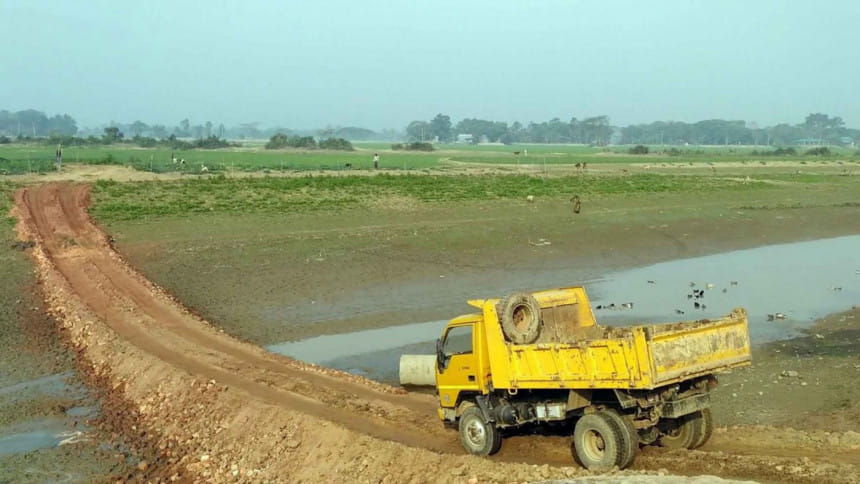River grabbing seems unstoppable

According to a report by The Daily Star on February 25, a road has been built right through the Ubdakhali river in the Bahadurkanda area of Netrokona's Kalmakanda upazila by the owners of a brick kiln called SRS Bricks. The road is essentially going to serve as a dam which will obstruct the river's water flow which will in turn create a shortage of irrigation water for growing crops in that area. When contacted, the executive engineer of the Water Development Board in Netrokona admitted that this would cause ecological destruction to the area, while the assistant director of the local Department of Environment office also revealed that the said brick kiln has been operating illegally even after its environmental clearance certificate was revoked on grounds of various rules violations. It is very disappointing to see the death of another natural asset right under the nose of our public officials.
The Brick Manufacturing and Brick Kilns Establishment (Control) Act, 2013 states that setting up brick kilns on government or privately owned forests, sanctuaries, agricultural land, gardens and wetland areas is a punishable offence. On July 1, 2019, the High Court released its 17-point judgment on river grabbing where it clearly stated that "killing a river is virtually a collective suicide for all". But the latest report published by the National River Conservation Commission (NRCC) on the current state of our rivers indicates that none of these regulations are having an impact on the number of river grabbing incidents. According to this report, the number of our rivers has come down from 700 (in pre-independence times) to only 405 at present. A total of 139 rivers in 64 districts have been encroached upon, among them 29 rivers severely polluted. Also, the four rivers surrounding Dhaka district have been already declared as biologically dead. The condition of the Turag river was in such a dire state that the High Court had to declare it as a "legal person" and "living entity" to prevent its doom.
Though the NRCC has been declared as the legal guardian of all rivers in our country by the highest judicial body, it alone cannot protect our rivers from being grabbed by the socially and politically influential figures if other government agencies like the Bangladesh Inland Water Transport Authority (BIWTA) and Bangladesh Water Development Board also do not come forward and join forces to carry out this vital duty. All these concerned authorities have to act collectively if any sustainable change to the trend of encroachment of waterbodies has to be brought.

 For all latest news, follow The Daily Star's Google News channel.
For all latest news, follow The Daily Star's Google News channel. 



Comments